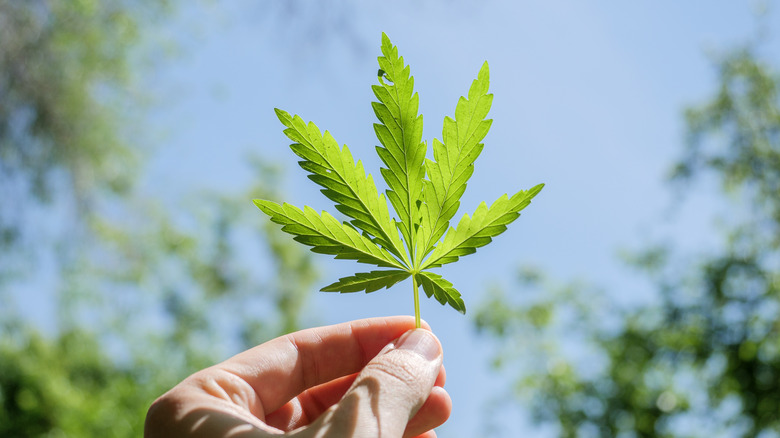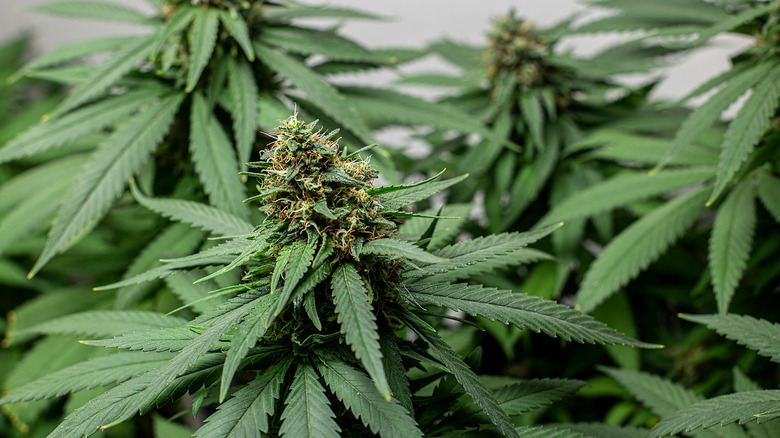Why Smoking Marijuana Can Make Your Asthma Worse
If you have asthma, will marijuana help out or cause more harm than good? The answer to this question isn't as straightforward as you may think. Weed legalization is sweeping the nation, with a majority of American states now allowing the use of medical marijuana. In the United States, medical marijuana is legal in 37 states, 19 states have legalized marijuana use altogether, and 27 states have either partially or completely decriminalized some laws surrounding marijuana possession (via USA Today). But if you have asthma, should you be smoking it?
Smoking may seem counterintuitive if you have a respiratory health condition like asthma, but according to a recent survey published in Annals of Allergy, Asthma and Immunology, 50% of regular marijuana consumers that have uncontrolled asthma are smoking it — and only a small number of doctors are asking their patients about it. "We also found that people with asthma are not routinely being asked or advised by their physician about cannabis and how they are consuming it," according to Joanna Zeiger, Ph.D., lead investigator of the report (via News Medical Life Sciences).
Smoking marijuana for asthma
In America, approximately one in every 13 people have asthma, a life-long health condition that affects the respiratory system (via National Heart, Lung, and Blood Institute). Asthma can cause your airways to become inflamed and constricted, making it harder to breathe. This can lead to shortness of breath, coughing, wheezing, and feeling tight in the chest. While there is no cure for asthma, there are some treatments that can help ease or prevent symptoms. Some people who suffer from asthma use medications to treat symptoms, while others prefer alternative options and may consider giving marijuana a try as a potential solution. However, weed may worsen asthma symptoms — depending on how it's consumed (via Healthline).
Due to its legal status, studying the effects of smoking marijuana have been a challenge — as a result, some studies have conflicting conclusions. One study suggests that marijuana may have some benefits to asthma patients, including bronchodilator and anti-inflammatory effects, however smoking it has a negative impact on the lungs. Other studies have linked cannabis smoking to increased respiratory issues. Overall, it seems that there may be some benefits to using marijuana for asthma, but smoking it can make symptoms worse.
Smoking causes inflammation
An interesting study on "Marijuana and lung diseases" suggests that low amounts of marijuana consumption may not be harmful to the respiratory system, but smoking weed regularly has been linked with chronic bronchitis symptoms and inflammation of the airways. However, figuring out what is classified as a "low dosage" and how much is too much is extremely difficult to measure. When it comes down to it, smoking in general — whether it's weed, tobacco, or any other substance — can lead to inflammation in the lungs, which can cause asthma symptoms to be more severe (via Healthline).
According to a study published in PLoS Medicine, smoking weed has been linked to increased levels of "inflammatory markers" as well as cardiovascular disease. Since asthma is classified as a respiratory health issue that causes inflammation in the airways, anything that induces more inflammation in the lungs and airways is a recipe for potential disaster.
It can trigger an asthma attack
There are many things that can trigger an asthma attack and smoking weed might be one of them. Asthma attacks happen when the airways become inflamed and tighten, restricting your airflow. During an attack, it may feel like you can't breathe — some people report that it feels like the air is "sucked out of them" or like they are "trying to suck air in through a straw" (via National Heart, Lung, and Blood Institute).
While everyone is different and has triggers unique to them, some common causes for asthma attacks include indoor allergens like dust, mold, or pet dander; outdoor allergens such as pollen; emotional stress; physical activity; getting sick; poor air quality; and specific types of medicines, including aspirin. Some scientific studies also suggest smoking weed as a potential trigger for asthma attacks (via Medical News Today). Severe asthma attacks may be life-threatening and often result in a trip to the emergency room.
You might be allergic to pot
If you smoked weed in the past and it didn't go well, don't brush it off thinking you got too high — you might be allergic. Studies confirm that being allergic to marijuana is not only possible, but it's more common than you may think, as more and more people are reporting that they are allergic to the plant. Marijuana allergy symptoms share many of the same symptoms as environmental or seasonal allergies, like a dry cough; congestion; itchy, red, or watery eyes; runny nose; sneezing; or an irritated throat (via Medical News Today).
It's important to emphasize that the marijuana plant, Cannabis sativa, also known as hemp, is a flower that contains pollen – a commonly known trigger for asthma attacks. Actually, when it comes to asthma attacks, allergens like pollen are usually to blame. Many people suffer from allergic asthma, which is when allergens cause symptoms to arise (via Asthma and Allergy Foundation of America). This means that if you have allergic asthma or know pollen is a trigger for you, smoking weed may make your symptoms worse.
It can damage your lungs
There is mounting evidence that suggests that smoking marijuana is harmful to your lungs, according to the American Lung Association. When compared to cigarette smoke, weed smoke contains similar amounts of tar and may even have higher levels of chemicals in it that have been linked to cancer (via Health Union). In theory, the lungs of cannabis smokers are exposed to these toxins for prolonged periods of time — marijuana smokers tend to inhale deeply and hold the smoke in their lungs when smoking.
Smoking pot has been proven to damage the cells in your lung airways, which may be a contributing factor to marijuana smoke causing symptoms like a chronic cough, excess phlegm, wheezing and acute bronchitis. In addition, those who heavily smoke weed have been linked to a risk of air pockets or bubbles, called bullae, forming in the lungs. These air bubbles can gradually grow and have the potential to pop, which can be life-threatening (via Healthline).
Marijuana can lower your immunity
Smoking marijuana has also been linked to immune system suppression. According to the American Lung Association, smoking weed alters the ability of your lungs to fight against infection, leaving them more vulnerable to many diseases, including lower respiratory tract infections. Smoking cannabis can damage cells in the lungs that function to expel allergens and germs, which can also lead to excess mucus production and a decrease in immune system function. This is especially a cause for concern for people who already struggle with diminished immune systems due to immunosuppressive medication or conditions that affect immunity like human immunodeficiency virus (HIV).
The American Lung Association reports that regular weed smokers tend to visit the doctor more for respiratory conditions and complaints, compared to those who don't smoke. Respiratory infections — like the cold, flu, COVID, pneumonia, and others — can intensify asthma symptoms (via Asthma and Allergy Foundation of America). In addition, people with asthma tend to develop more severe respiratory symptoms when they get sick.
Vaping may not be better
People often make the wrong assumption that "vaping is better" because it doesn't require you to inhale smoke. However, vaping may not be the best solution out there (via Healthline). Technically, vaping is short for "vaporizing" and here's how it works: Heat is applied to the dried marijuana plant or a liquid cannabis extract, then the consumer inhales vapor that contains the active ingredients of the plant. While some scientific research suggests that vaping is less likely to damage the lungs when compared to smoking, other studies stress that more research needs to be done to support the theory that vaping is a healthier alternative. "Preliminary findings do not support the idea that vaporization is an improvement over smoking" (via Medical News Today).
The truth is, there hasn't been enough scientific research done on vaping to confirm that it's safe. Some preliminary findings suggest that vaping could be harmful to the lungs due to vitamin E acetate, an unnatural additive in a lot of cannabis vaping products with THC (per Healthline). According to the Allergy and Asthma Network, people who have asthma are generally advised against smoking or vaping cannabis because it may lead to an asthma attack.
Ingesting marijuana
Fortunately, if you have asthma, you can still dabble in the weed world without potentially triggering an asthma attack — if you live somewhere where it's legal, of course. These days, marijuana comes in many forms, from herbal tincture extracts and capsules, to gummies, chocolates, and more. Eating pot is less likely to aggravate your lungs compared to smoking it (via Healthline). And there may be some benefit to consuming marijuana when it comes to treating asthma symptoms. There are some theories that the anti-inflammatory effects of cannabis may help soothe the inflammation caused by asthma — it's the smoke that triggers inflammation in the lungs, not the marijuana itself.
Weed stimulates "endocannabinoid receptors" in the lungs that help regulate your immune system response to inflammation, Dr. Janice Knox told Allure. "[Asthma is] a chronic inflammatory process that involves the lungs, the bronchioles, etc. And it's an imbalance in the immune system that the endocannabinoid system does address," she said. Dr. Knox advises against smoking weed if you have asthma. She also recommends that if you choose to eat weed, take it slow, especially if you've never done it before. Eating pot can feel more intoxicating than smoking it due to the way the liver processes marijuana. It's wise to eat a small amount and wait several hours to see how you feel. If you eat too much in one go, it might be nap time.
Other treatment options
Many types of treatment options have been helpful for those struggling with asthma — these include several medications, from pills to inhalers. Speak with your doctor to determine which medication would work best for you depending on your condition. Many people with asthma find that avoiding their known triggers is extremely helpful in preventing symptoms or full-on asthma attacks.
There are also several common natural remedies for both preventing and soothing asthma, like breathing exercises, a healthy diet, yoga, some types of exercise, and acupuncture (via K Health). Some of these alternative treatments can help soothe symptoms as they come up, as well as strengthen your lungs over time. Keep in mind that asthma can gradually get worse without adequate treatment, so it's best to work with a medical professional to come up with the right treatment plan for you.










